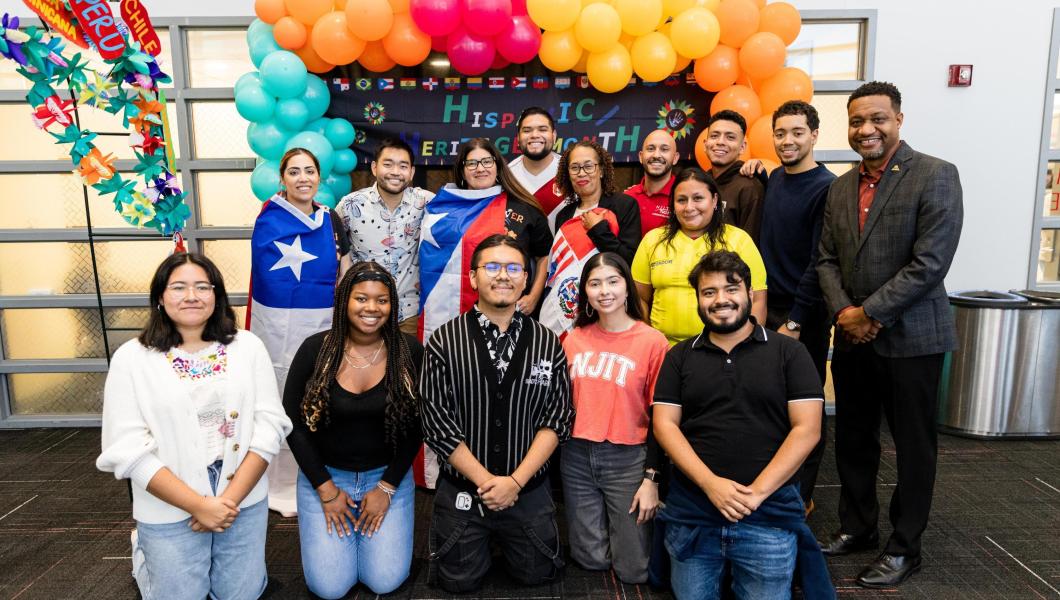VentureLink Alum Randal Pinkett Speaks for Black History Month Celebration

Engineer and diversity consultant Randal Pinkett opened New Jersey Institute of Technology’s Black History Month celebration by directly addressing inequities that still face minority communities in 2024.
Pinkett worked out of NJIT’s VentureLink startup incubator and earned an honorary doctorate of science in 2007. “It has been an absolute blessing to be a part of this university community. Everywhere I go, I carry my NJIT ID,” he said.
But he knows that life is more challenging for many minorities, whether in Newark or around the world. In reflecting on defining moments in Black American history — from Lincoln’s Emancipation Proclamation to Robert Barney, the first Black Highlander, class of 1926 — “I don't think I'm getting too grandiose in saying that we are squarely situated right in the middle of another defining moment,” Pinkett observed. “And this one relates to three very specific words, diversity, equity, and inclusion … We find ourselves at a DEI-defining moment that could determine its fate for the foreseeable future, on college campuses and beyond. And if you didn't know, you better ask somebody.”
“You see in this room, you see on this campus, you see it across our country, so-called minorities will be the majority of our country in the year 2042, 18 years away. They are already the majority in Hawaii, California, Texas, Nevada, Maryland, Georgia, and will be the majority in New York and Florida in less than a decade. 70% of new entrants to the workforce today are women and people of color. Babies born today in New Jersey are the majority minority. We're gonna accept this, I tell others, or we can move to the fifty-first state of the union — the state of denial.”
“But alongside this increasing societal diversity, it's also been increasing social discord,” Pinkett said, noting current events ranging from the May 25, 2000 murder of George Floyd to ongoing anti-DEI efforts in many states.
jones.jpg

“We find ourselves now at a crossroads in higher education, a philosophical, political and practical tug-of-war between trend number one, diversity, and trend number two, reversity. … “I don't know what the answer is. But I know where the answer lies, it lies in each and every one of you.”
The event planning committee illustrated such collaboration, led by co-chairs Lucie Tchouassi, associate dean for academics in NJIT’s Newark College of Engineering, and Sanjeannetta Worlee, associate director of facilities and conferences in residence life. Rounding out the committee leadership were Angela Garretson, chief government and community relations officer, and David Jones, chief diversity officer.
"As a proud alumni and long-time member of the NJIT community, my role as co-chair of the Black History Month committee is about more than just organizing events, it's about promoting a sense of belonging and empowerment. I'm constantly inspired by the collaborative effort and support provided by students, staff, instructors and administrators during the planning process," Tchouassi stated. "It reflects the essence of togetherness and perseverance, reminding us that Black History Month is about more than just remembering the past, it's also about embracing the present and creating a more inclusive future. To me, it represents our dedication to elevating Black voices, preserving legacies, and developing cross-community understanding."
A theme for the month — “Our Roots. Our Rhythms. Our Stories. Celebrating The Tapestry of Black Family Artistry and Unity” — was selected by an NJIT group called The Union of Black Students. Vincent Oria, the first Black chairman of NJIT's computer science department, loaned African artwork to display. Residence life coordinator Shamier McKenzie performed Lift Every Voice and Sing, known as the Black National Anthem, and student Ivana Nwaobi sang the American national anthem. NJIT’s Marybeth Boger, vice president of student affairs and dean of students; Jason Baynes, of the Board of Trustees; and President Teik Lim all gave remarks.
“When I see all of these people here to celebrate Black History Month, it just makes me super proud,” Baynes said. He first came to Newark in the summer of 1988 for a pre-engineering program with NJIT’s Center for Pre-College Programs. “There's talent equitably spread around the earth, but the opportunity and access are not,” he added.
Reflecting on the program, “That's what really got me interested in science and hands-on stuff. That was a life-changing experience. That's what made me become a Black doctor,” he noted. “There's so much to learn about Black history. We do that on a daily basis, but this is our month to celebrate.”
20240207-BlackHistoryMonth-106.jpg

Fimi Are, president of the NJIT chapter of the National Society of Black Engineers, said she found Pinkett’s speech inspiring. “I think it was an amazing event. I learned a lot about Black history,” she said.
Are is a senior majoring in chemical engineering. She grew up in Nigeria wanting to become a nurse or doctor, but in high school discovered her passion for problem-solving. But for this month, she said, “I just want to encourage all NJIT people to come out for our Black History programs and events, and just learn more.”
Additional NJIT events for Black History Month included a Black Excellence in Engineering gathering on Feb. 12, along with lectures throughout the month by New Hope Elizabeth’s Rev. Steffie Bartley Sr., regional director of National Action Network; Shoshanna Page, policy advisor from the Newark mayor’s office; Brittney Cooper, associate professor of women, gender and Africana studies at Rutgers New Brunswick; and Walter Kimbrough, former president of two Historically Black universities. Also scheduled were a Black Alumni Society panel, Feb. 20 and National Society of Black Engineers Martin Luther King Jr. banquet, Feb. 29. Click here for the full calendar.
20240207_160919.jpg


